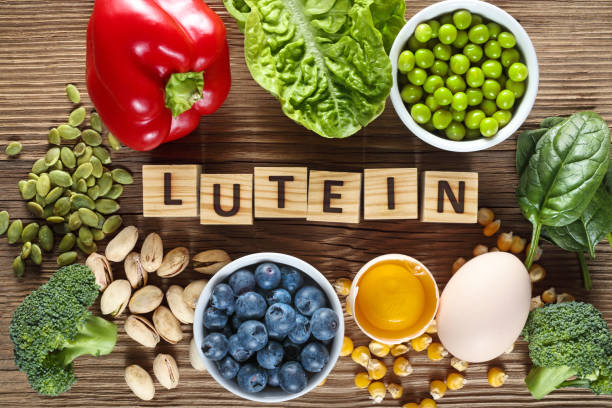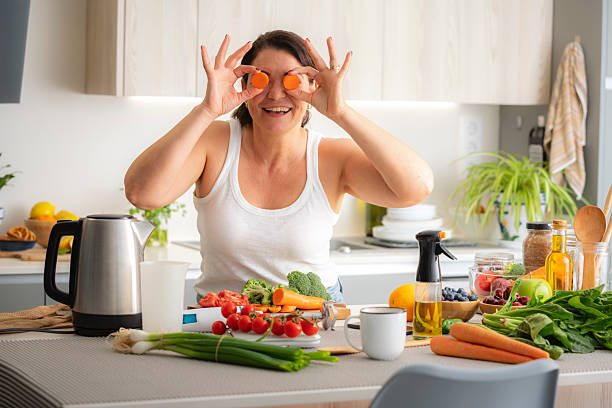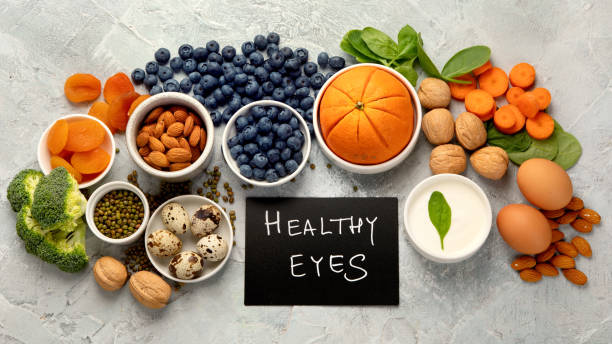Introduction
Taking care of vision starts with smart food choices that feed and protect your eyes. In this post, you’ll discover easy nutrition tips that help keep your eyes bright, sharp, and healthy for years to come. From colorful fruits and leafy greens to nuts and omega-rich fish, the right foods can guard against eye strain, dryness, and even age-related vision loss. Whether you’re reading a book, working long hours on screens, or enjoying nature’s beauty, good eye nutrition makes a real difference in how well you see and feel. Let’s explore simple, everyday ways to support and strengthen your vision!
Why Nutrition for Eye Health Matters
Food gives the eyes what they need to stay strong and function at their best. When you eat the right ingredients, like vitamin-rich vegetables, omega-3 fatty acids, and antioxidant-packed fruits, you help protect your sight from damage, reduce eye tiredness, and even slow age-related vision loss. These nutrients support healthy blood flow, reduce inflammation, and keep your eyes moist and comfortable. Healthy vision means more comfort, ease, and joy in daily life—whether you’re reading, driving, or simply taking in the view around you.

Top Nutrients for Healthy Eyes
Here are key nutrients your eyes love:
Vitamin A & Beta-Carotene
Helps with night vision and light changes by supporting the retina and improving the eye’s ability to adjust in dim or bright settings. This nutrient plays a key role in preventing night blindness and reducing eye strain in low light. Found in carrots, sweet potatoes, and leafy greens, it also protects the surface of the eye and keeps vision clear.
Lutein & Zeaxanthin
Protect eyes from bright light and harmful rays by filtering out high-energy light waves that can damage the retina over time. This nutrient acts like natural sunglasses, reducing glare and helping maintain sharp vision in both sunlight and artificial light. Rich in spinach, kale, and corn, it also supports long-term eye health and lowers the risk of age-related eye problems.
Omega-3 Fatty Acids
Supports retina and lowers dry-eye risk by keeping the eye’s surface moist and reducing inflammation. This nutrient helps maintain healthy cell membranes in the eyes, which is key for sharp vision and overall comfort. Found in salmon, chia seeds, and walnuts, it also aids in protecting against age-related vision changes and supports healthy blood flow to the retina.
Vitamin C & E
Powerful antioxidants for long-term eye health that fight damage from free radicals and help protect the delicate tissues of the eyes. These nutrients lower the risk of cataracts and age-related vision loss while supporting overall eye function. Vitamin C in oranges and bell peppers boosts collagen for healthy corneas, while Vitamin E in almonds and sunflower seeds shields cells from oxidative stress. Together, they help keep vision clear and strong over time.
Zinc
Aids vision at night and helps absorb vitamin A, which is essential for the retina to function properly in low-light conditions. This mineral also supports the immune system and protects eye tissues from damage. Found in shellfish, beef, and dark chocolate (in small amounts!), it plays a key role in maintaining clear vision and reducing the risk of night blindness.
Key Foods to Include
Add these to your meals for bright, healthy eyes:
- Dark leafy greens: Spinach, kale, and Swiss chard are rich in lutein and zeaxanthin, which protect against harmful light and support long-term vision health.
- Colorful vegetables: Carrots, sweet potatoes, and bell peppers give you beta-carotene and vitamin C to boost night vision and guard against damage.
- Fatty fish: Salmon, sardines, and mackerel provide omega-3 fatty acids that keep eyes moist, reduce inflammation, and support the retina.
- Whole grains & legumes: Lentils, chickpeas, and brown rice offer zinc, B vitamins, and fiber that improve blood flow and overall eye function.
- Nuts & seeds: Almonds, walnuts, chia, and sunflower seeds supply vitamin E and healthy fats to protect eye cells from oxidative stress.
- Citrus & berries: Oranges, strawberries, and blueberries are loaded with antioxidants and vitamin C to strengthen blood vessels in the eyes.
- Egg yolks: Rich in lutein, zeaxanthin, and other helpful nutrients that enhance visual clarity and protect against age-related vision loss.

Sample Daily Meal Plan for Vision Support
Here’s an easy day plan packed with eye-healthy nutrients:
- Breakfast: Spinach and scrambled eggs give you lutein, zeaxanthin, and protein for strong eyes, paired with orange slices for a boost of vitamin C.
- Snack: Almonds or a small bowl of berries provide vitamin E and antioxidants to protect eye cells from damage.
- Lunch: Salmon salad with mixed greens, carrots, and bell peppers delivers omega-3s, beta-carotene, and vitamin C to keep vision sharp and eyes comfortable.
- Afternoon Snack: Whole-grain toast with hummus or chia seed pudding adds fiber, healthy fats, and zinc to support overall eye health.
- Dinner: Grilled mackerel with roasted sweet potatoes and steamed kale offers omega-3s, vitamin A, and antioxidants for long-term protection.
- Dessert: A small bowl of berries or a citrus fruit supplies a sweet dose of vitamin C and antioxidants to round out your day of vision-friendly eating.
Practical Tips for Everyday Eating
Make these simple habits part of your routine:
- Add greens first: Toss in a handful of spinach before anything else so you’re starting meals with eye-protecting vitamins and antioxidants.
- Use color as a guide: More carrot orange, bell pepper red, and leafy green means more nutrients like vitamin A, vitamin C, and lutein for stronger vision.
- Swap smart: Replace chips with berries or nuts to get fiber, healthy fats, and antioxidants that protect against eye strain.
- Snack on fish or seeds: Salmon, sardines, chia seeds, or flaxseeds are great sources of omega-3s that support the retina and keep eyes moist without extra effort.
- Stay hydrated: Drinking enough water helps eyes stay moist, reduces dryness, and works better with good nutrition to keep vision clear.
Common Questions (You Might Ask)
Can I just take vitamins instead of eating well?
Supplements can help fill small nutrient gaps but they don’t replace whole foods. Whole foods give fiber, antioxidants, and plant compounds that work together to protect your eyes in ways pills alone can’t. Fresh fruits, vegetables, nuts, seeds, and fish offer a natural balance of vitamins and minerals your body absorbs more easily. If you plan on using supplements, talk to your doctor to make sure they’re safe, effective, and the right dose for your needs.
What if I’m vegan or allergic to fish?
No problem! You can still get the nutrients your eyes need from plant-based sources. Try chia seeds, flaxseed, and walnuts for omega-3s that help keep your eyes moist and reduce inflammation. Rainbow fruits and vegetables give you a variety of vitamins, antioxidants, and plant compounds that protect vision. Nuts and seeds also add vitamin E and healthy fats, which support long-term eye health without relying on fish.
Is eyesight improvement fast?
You may notice better energy, less dryness, and more comfort within a few weeks as your eyes get the nutrients they need. Clearer focus and reduced strain can also show up quickly if you’re eating more colorful vegetables, omega-rich foods, and antioxidant-packed fruits. Long-term benefits, like stronger protection against vision loss or age-related changes, work over months or even years, building as you maintain healthy eating habits.
Benefits You’ll Feel
Adding these foods can help you:
- See better in low light and at night by improving how your eyes adjust to darkness and reducing glare.
- Reduce screen fatigue by lowering eye strain, easing dryness, and improving focus during long hours on computers or phones.
- Slow down age-related vision loss by protecting the retina and lens from damage caused by free radicals and harmful light.
- Keep eyes moist and bright by supporting tear production and reducing inflammation that can make eyes feel gritty or irritated.
- Support overall health with fewer dry eyes or strain, giving you clearer, more comfortable vision for work, reading, or outdoor activities.

How to Keep These Habits Going
Here’s how to build lasting healthy habits:
- Start easy: Just one cup of spinach in your meals each day to give your eyes a boost of vitamins and antioxidants without changing your whole diet at once.
- Plan ahead: Batch prep roasted veggies and fish so you always have nutrient-rich, eye-friendly meals ready when you’re busy.
- Make it fun: Try smoothies with berries, chia, and spinach for a quick, colorful way to pack in eye-protecting nutrients.
- Keep variety: Rotate kale, collards, arugula, and Swiss chard to keep your meals exciting and ensure you get a wide range of vitamins and minerals for vision health.
- Track progress: Note when you feel less tired, your eyes feel more comfortable, or you can focus longer—signs your healthy eating is working.
Conclusion
Your diet is more than food—it’s fuel for your vision and a key part of long-term eye health. By including foods rich in vitamin A, lutein, omega-3s, vitamin C, vitamin E, and zinc, you give your eyes powerful support to function at their best. These nutrients help protect the retina, keep the cornea healthy, and fight off damage from harmful light and free radicals.
The changes are simple: add colorful veggies, fatty fish or plant-based options, nuts, seeds, and citrus fruits to your meals. Over time, you can notice better comfort, reduced dryness, sharper focus, and more resilience in your vision—whether you’re reading, working, or enjoying the outdoors.
What will you try first? A spinach-packed breakfast smoothie, sweet potato dinner, or berry snack? Share your plan or questions below—I’d love to hear!

